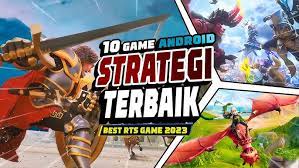Title: Real-Time Strategy Games: Mastering the Art of Strategic Thinking in the Digital Realm Introduction
Real-Time Strategy (RTS) games have been a cornerstone of the gaming industry since the late 20th century. These games offer players a unique opportunity to immerse themselves in complex, strategic worlds where decisions must be made on the fly, often under intense pressure. Combining resource management, tactical planning, and quick decision-making, RTS games challenge players' strategic thinking and offer a dynamic and engaging gaming experience.
The Evolution of Real time strategi Games
The roots of RTS games can be traced back to early titles like "Dune II" and "Command & Conquer," which laid the foundation for the genre. These games introduced the concept of controlling armies in real-time, requiring players to gather resources, manage economies, and outmaneuver opponents. As technology advanced, so did the complexity of these games. "StarCraft," released in 1998, further refined the genre with its distinct factions, balanced gameplay, and competitive multiplayer scene.
Core Gameplay Mechanics
At the heart of RTS games lie fundamental gameplay mechanics that define the experience. These mechanics include:
Base Building and Resource Management: Players establish and expand their bases by constructing buildings, gathering resources (such as minerals, gas, or energy), and managing economies to fuel their armies.
Unit Diversity: A variety of units with unique strengths and weaknesses are at the player's disposal. Strategic deployment and proper unit composition are crucial for success.
Tactical Warfare: Battles unfold in real-time, demanding quick thinking and adaptability. Players must formulate effective strategies for engaging opponents, exploiting terrain, and using unit abilities.
Tech Tree and Upgrades: Most RTS games incorporate a tech tree system, allowing players to research upgrades and unlock advanced units as the game progresses.
Multiplayer Competitions: Many RTS games offer competitive online multiplayer modes, challenging players to outwit human opponents in high-stakes matches.
Cultivating Strategic Thinking
RTS games are renowned for nurturing strategic thinking skills. Players must think critically and plan ahead to succeed. The games promote:
Decision-Making Under Pressure: The real-time nature of RTS games means decisions must be made quickly, even as the situation changes. This teaches players to analyze situations swiftly and make calculated choices.
Resource Allocation: Efficiently managing resources is essential. Players learn to prioritize between economy growth and military expansion, teaching valuable resource management skills.
Adaptation: As opponents employ diverse tactics, players must adapt their strategies on the fly. This fosters flexibility and the ability to adjust to unexpected challenges.
Long-Term Planning: Successful players think several steps ahead. They anticipate the consequences of their actions and plan for various scenarios.
Risk Assessment: Each move carries risks. Players learn to assess potential rewards against possible setbacks, a skill applicable in various real-life scenarios.
Conclusion
Real-Time Strategy games offer a dynamic and intellectually stimulating gaming experience that challenges players' strategic thinking, decision-making abilities, and adaptability. Over the years, the genre has evolved and grown, becoming a vital part of the gaming industry. The lessons learned from commanding virtual armies and managing complex economies can translate into valuable skills in the real world. Whether you're a casual gamer or a competitive enthusiast, RTS games continue to captivate and educate players in the art of strategic thinking.
.jpg)

.jfif)
Comments
Post a Comment